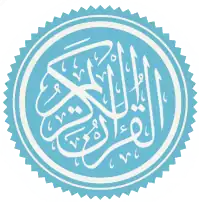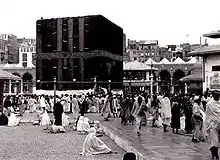Bakkah
Bakkah (Arabic: بَكَّةُ [ˈbɛk.kɛh]), is a place mentioned in sura 3 (’Āl ‘Imrān), ayah 96 of the Qur'an, a verse sometimes translated as: " Verily the first House set apart unto mankind was that at Bakkah, blest, and a guidance unto the worlds",[1]
| Quran |
|---|
 |
|

According to Muslim scholars, Bakkah is an ancient name for Mecca, the most holy city of Islam.[2] (The word Mecca is only used once in the Quran in verse 48:24 ("and it is He who withheld their hands from you and your hands from them within [the area of] Makkah after He caused you to overcome them. And ever is Allah of what you do, Seeing."))[3][4][5]
Most Muslims believe Mecca and Bakkah are synonyms, but to Muslim scholars there is a distinction: Bakkah refers to the Kaaba and the sacred site immediately surrounding it, while Mecca is the name of the city in which they are both located.[6]
According to Lisān al-‘Arab of Ibn Manẓūr, the site of the Kaaba and its surroundings was named Bakkah due to crowding and congestion of people in the area. The Arabic verb bakka (بَكَّ), with double "k", means to crowd like in a bazaar. This is not to be confused with another unrelated Arabic verb bakā (بَكَىٰ) (single k) which is the past participle of yabkī (يَبْكِي), to cry.
Bakkah and Mecca
Islamic tradition identify Bakkah as the ancient name for the site of Mecca.[2][7][8][9] An Arabic word and its etymological meaning ascribed to it is "narrow", seen as descriptive of the area in which the valley of the holy places and the city of Mecca are located, pressed in upon as they are by mountains.[7] Widely believed to be a synonym for Mecca, it is said to be more specifically the early name for the valley located therein, while Muslim scholars generally use it to refer to the sacred area of the city that immediately surrounds and includes the Kaaba.[6][10][11]
The form Bakkah is used for the name Mecca in the Quran in 3:96, while the form Mecca is used in 48:24.[4][5] In South Arabic, the language in use in the southern portion of the Arabian Peninsula at the time of Muhammad, the b and m were interchangeable.[5] The Quranic passage using the form Bakkah says: "The first sanctuary appointed for mankind was that at Bakkah, a blessed place, a guidance for the peoples."[7][12] Other references to Mecca in the Quran (6:92, 42:7) call it Umm al-Qura, meaning "mother of all settlements".[5]
In Islamic tradition, Bakkah is where Hagar and Ishmael (Ismā'īl) settled after being taken by Abraham (Ibrāhīm) to the wilderness, a story parallel to the Bible's Book of Genesis (21:14-21)(but see below for the biblical geography).[8][13] Genesis tells of how after Hagar and Ishmael ran out of water to drink.[8] In Arab tradition, Hagar runs back and forth between two elevated points seven times to search for help before sitting down in despair, at which point the angel speaks as recorded in Genesis 21:17-19:
God heard the cry of the boy, and an angel of God called to Hagar from heaven and said to her, 'What troubles you, Hagar? Fear not, for God has heeded the cry of the boy where he is. Come, lift up the boy and hold him by the hand, for I will make a great nation of him.' Then God opened her eyes and she saw a well of water. She went and filled the skin with water and let the boy drink.[10]
Here, the tradition holds that a spring gushed forth from the spot where Hagar had laid Ishmael, and this spring came to be known as the Well of Zamzam.[8][10] When Muslims on hajj run between the hills of Safa and Marwah seven times, it is to commemorate Hagar's search for help and the resulting revelation of the well of Zamzam.[10]
In addition to the Islamic tradition that Hagar and Ishmael settled in Bakkah, the Quran relates that Abraham came to Mecca to help his son Ishmael build the Kaaba adjacent to the well of Zamzam.[8][10] However, in the Bible and ancient Jewish, Christian, and pre-Islamic tradition, Abraham is never mentioned as traveling far south into Arabia (Mekka is about 1400 kilometers south of Hebron, where Abraham is said to be buried). Ishmael is mentioned in Genesis at Abraham's funeral.[14]
Ibn Ishaq, the 8th-century Arab Muslim historian, relates that during the renovation of Kaaba undertaken by the Quraysh before Islam, found an inscription in one of the corners of the foundation of the building that mentions Bakkah. Composed in Syriac, it was incomprehensible to the Quraysh until a Jew translated it for them as follows: "I am Allah, the Lord of Bakka. I created it on the day I created heaven and earth and formed the sun and the moon, and I surrounded it with seven pious angels. It will stand while its two mountains stand, a blessing to its people with milk and water."[15]
The name Bakkah is woven into the kiswa, the cloth covering the Kaaba that is replaced each year before the Hajj.[16]
Valley of Baca
Valley of Baca ("Valley of the Baka") is mentioned in the Book of Psalms Chapter 84, in the following passage:
Blessed is the man whose strength is in thee; in whose heart are the ways of them. Who passing through the valley of Baca make it a well; the rain also filleth the pools. They go from strength to strength, every one of them in Zion appeareth before God.
The original Hebrew phrase for the Valley of Baca is עמק הבכא, emeq ha-Baka.[17][18][19] A literal translation is "Valley of the Baka", although the ancient Greek translation assumed a similar-sounding word בכה "crying" and translated ἐν τῇ κοιλάδι τοῦ κλαυθμῶνος "valley of mourning". The same Hebrew word בכא is associated with a famous battle in 2 Samuel 5:23-24 in the Valley of Rephaim,[20] about 4-7 kilometers southwest of the present day Old City of Jerusalem. David is advised to engage the Philistines in battle when he hears the sound of marching in the Baka trees (translated "mulberry trees" in the King James Version, although the specific tree to which בכא refers is not known—many modern translations suggest "balsam tree").
See also
References
- "Tanzil - Quran Navigator | القرآن الكريم". tanzil.net. Retrieved 2016-07-18.
- Barbara Ann Kipfer (2000). Encyclopedic dictionary of archaeology (Illustrated ed.). Springer. p. 342. ISBN 978-0-306-46158-3.
- Quran 48:24 Quran.com
- Kees Versteegh (2008). C. H. M. Versteegh; Kees Versteegh (eds.). Encyclopedia of Arabic language and linguistics, Volume 4 (Illustrated ed.). Brill. p. 513. ISBN 978-90-04-14476-7.
- Philip Khûri Hitti (1973). Capital cities of Arab Islam (Illustrated ed.). University of Minnesota Press. p. 6. ISBN 978-0-8166-0663-4.
- Oliver Leaman (2006). The Qur'an: an encyclopedia (Illustrated, annotated, reprint ed.). Taylor & Francis. p. 337. ISBN 978-0-415-32639-1.
- Cyril Glassé & Huston Smith (2003). The new encyclopedia of Islam (Revised, illustrated ed.). Rowman Altamira. p. 302. ISBN 978-0-7591-0190-6.
- William E. Phipps (1999). Muhammad and Jesus: a comparison of the prophets and their teachings (Illustrated ed.). Continuum International Publishing Group. p. 85. ISBN 978-0-8264-1207-2.
mecca becca.
- Alice C. Hunsberger (2000). Nasir Khusraw, the ruby of Badakhshan: a portrait of the Persian poet, traveller and philosopher (Illustrated ed.). I.B.Tauris. p. 174. ISBN 978-1-85043-919-6.
- Daniel C. Peterson (2007). Muhammad, prophet of God. Wm. B. Eerdmans Publishing. pp. 22–25. ISBN 978-0-8028-0754-0.
- Sher Ali Maulawi; Mirza Tahir; Ahmad Hadhrat (2004). The Holy Quran with English Translation. Islam International. p. 753. ISBN 978-1-85372-779-5.
- Quran 3:96–97:
The first House (of worship) appointed for men was that at Bakka: Full of blessing and of guidance for all kinds of beings:
In it are Signs Manifest; (for example), the Station of Abraham; whoever enters it attains security; Pilgrimage thereto is a duty men owe to Allah,- those who can afford the journey; but if any deny faith, Allah stands not in need of any of His creatures.— Qur'an, sura 3 (Al-i-Imran), ayat 96-97 - Genesis 21:14–21:21
- Genesis 25:9 "And his sons Isaac and Ishmael buried him in Hebron"
- F. E. Peters (1995). The Hajj: the Muslim pilgrimage to Mecca and the holy places (Reprint, illustrated ed.). Princeton University Press. p. 47. ISBN 978-0-691-02619-0.
- James George Roche Forlong (1897). Short studies in the science of comparative religions: embracing all the religions of Asia (Reprint ed.). Kessinger Publishing. p. 536. ISBN 978-0-7661-0157-9.
- Jan P. Fokkelman (2000). At the interface of prosody and structural analysis, Volume 2. Uitgeverij Van Gorcum. p. 235. ISBN 978-90-232-3381-7.
- Heribert Busse (1998). Islam, Judaism, and Christianity: theological and historical affiliations (Illustrated ed.). Markus Wiener Publishers. p. 186. ISBN 978-1-55876-144-5.
- Psalms 84:1–84:7 of the King James Version reads:
How amiable are thy tabernacles, O LORD of hosts!
My soul longeth, yea, even fainteth for the courts of the LORD: my heart and my flesh crieth out for the living God.
Yea, the sparrow hath found an house, and the swallow a nest for herself, where she may lay her young, even thine altars, O LORD of hosts, my King, and my God.
Blessed are they that dwell in thy house: they will be still praising thee. Selah.
Blessed is the man whose strength is in thee; in whose heart are the ways of them.
Who passing through the valley of Baca make it a well; the rain also filleth the pools.
They go from strength to strength, till each appears before God in Zion. - See, for example, Amos Hakham, Book of Psalms [Heb], vol. 2: 73-150, Jerusalem: Mossad Rav Kook, 1990, p. 104: "There are commentators who explain that `emeq ha-baka בכא is a valley where certain trees grow that are called בכאים "baka-trees," this valley is emeq refaim עמק רפאים "Valley of Ghosts" 2 Sam 5:22-24, and it is where pilgrims would ascend on their way to the temple area in Jerusalem" [translated from Hebrew]."